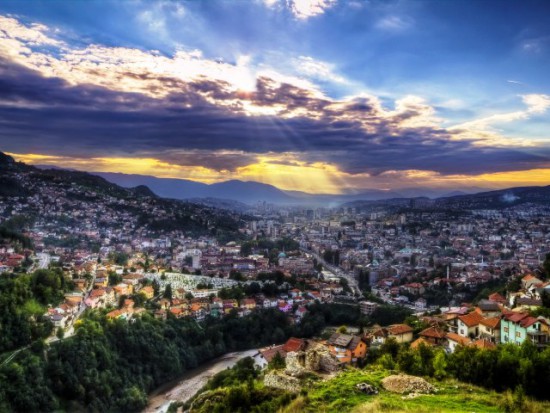Bosnia Urged to Foster Private Sector and Curb Graft
Bosnia needs to further develop its private sector and fight its rampant corruption in order to increase stability and prosperity, experts say.
Bosnia capital city, Sarajevo. Photo: Flickr
Bosnia needs to further develop its private sector, cut the public sector and fight pervasive corruption if it wants to increase its prosperity in future, experts say.
Increasing the private sector’s share in the economy is of primary interest for Bosnia, Ian Brown, the Head of Office of the European Bank for Reconstruction and Development in Bosnia, EBRD, told BIRN on Monday.
Brown noted that a general climate of mistrust surrounds the private sector in Bosnia, downplaying its further development. “There is still a general mistrust in Bosnia towards entrepreneurs and the private sector in general,” Brown maintained.
“This is mainly connected to some examples of failed privatisations of Bosnian public companies that were made in the past,” Brown explained, adding that, “for many persons, and especially for those who were born during socialist Yugoslavia, a state-run economy still represents the best option”.
Brown was among several top international officials who participated on Monday in the start of a two-day conference organised by the America Bosnia Foundation, the Center for Transatlantic Relations and the Johns Hopkins University in the Bosnian capital. The conference, “Focus on Reforms: A Vision 2020 for BiH,” centred on the reform agenda and the integration of Bosnia into the EU, and was attended by international officials and local politicians, including the Prime Ministers of both of Bosnia’s entities, the High Representative Valentin Inzko, the Head of the EU Delegation in Bosnia, Lars Gunnar Wigemark, Tatiana Proskuryakova, country manager of the World Bank, and the country chairman of the Board of Directors of Transparency International, Srdjan Blagovcanin.
Experts highlighted that one of the priorities for the Bosnian economy is to cut the importance of the public sector, which according to the International Monetary Fund is the second biggest in the region, with a current public expenditure of 41 per cent of the Bosnia’s GDP in 2014.
“The Bosnian public sector is too large, too inefficient, and it is not providing adequate services to Bosnian citizens compared to its costs,” Tatiana Proskuryakova told the conference. Proskuryakova praised the authorities for approving some important laws which will contribute to improving the business environment, like the labour reform which both entities have now passed. However, she noted that more needs to be done and that “Bosnia is still lagging behind other countries from the region in the Ease of Doing Business Index”, which was created by the World Bank to assess the quality of regulations influencing entrepreneurs who decide to operate in a country.
In 2016, Bosnia ranked 79th in the Ease of Doing Business Index, well behind Kosovo, in 66th place, Serbia, in 59th place, Montenegro (46), Croatia (40), Slovenia (29) and Macedonia, in 12th place.
Muamer Jarovic, a German entrepreneur originally from Bosnia who participated in the event, told BIRN that despite his desire to invest in the country, the excessive bureaucracy and lack of support from the authorities discouraged him. “Bosnia doesn’t have any incentive to help foreign investors“, he noted, adding that “there is too much bureaucracy and taxation is too high.”
Another major problem, which Bosnia needs to urgently tackle to improve its business climate, is widespread corruption, Srdjan Blagovcanin told the conference. “Corruption is the main problem,” Blagovcanin said. “Because of widespread corruption, hundreds of millions of euros disappear every year in Bosnia,” he claimed, adding that corruption should be the first issue to address in order to ensure reforms are conducted.
“Bosnian parties are the first that should be blamed for corruption … they are obstructing reforms, because only by protecting the status quo can they preserve their absolute control of the resources of the state,” he said.
17 May 2016

